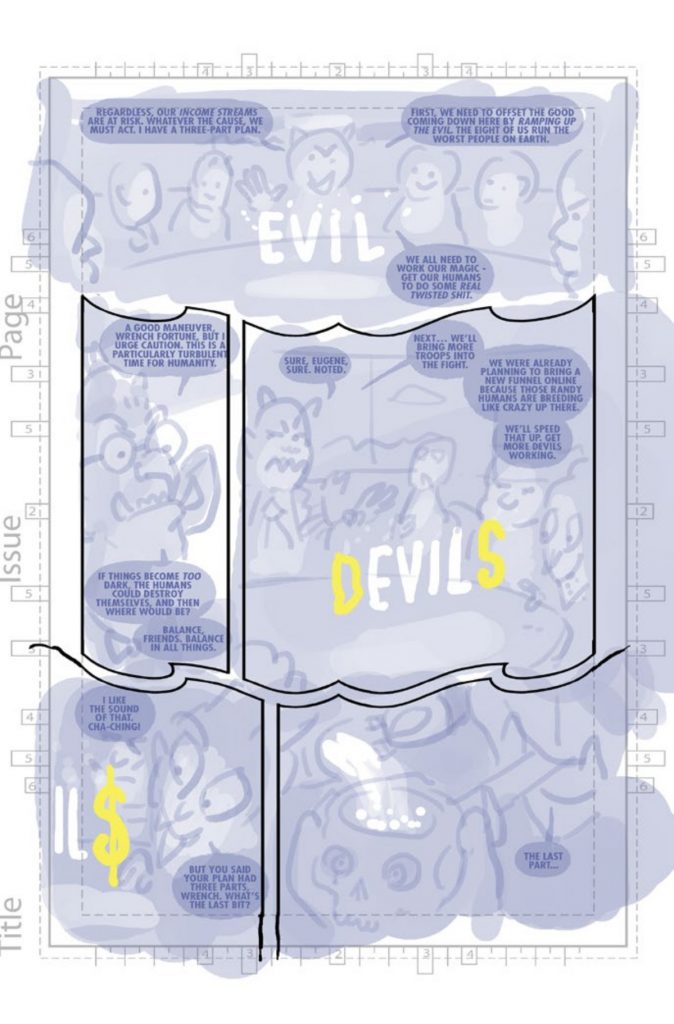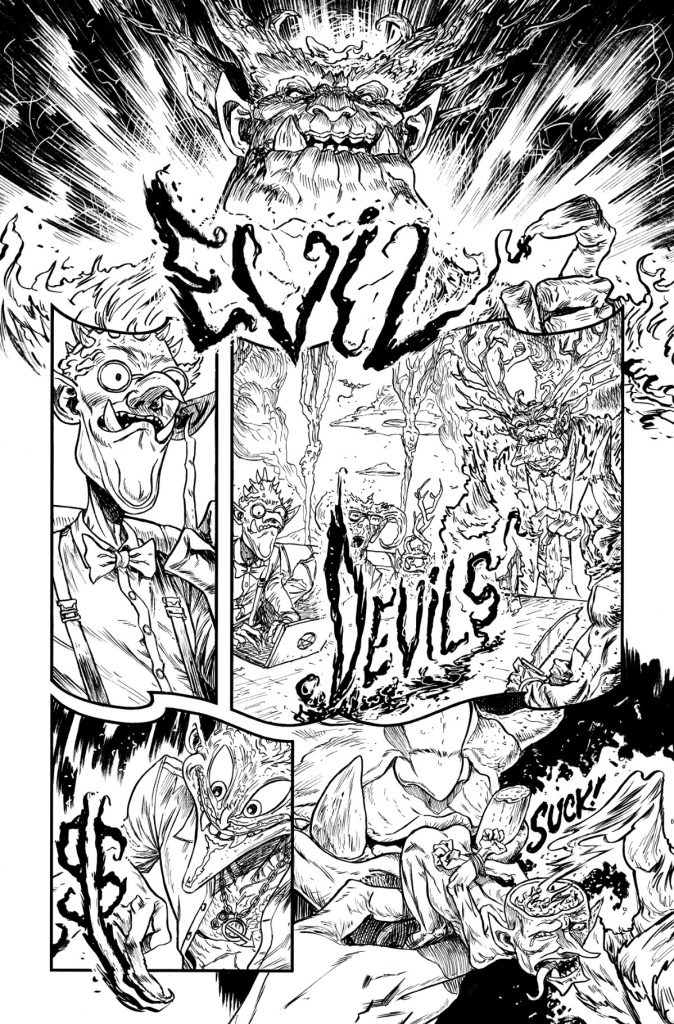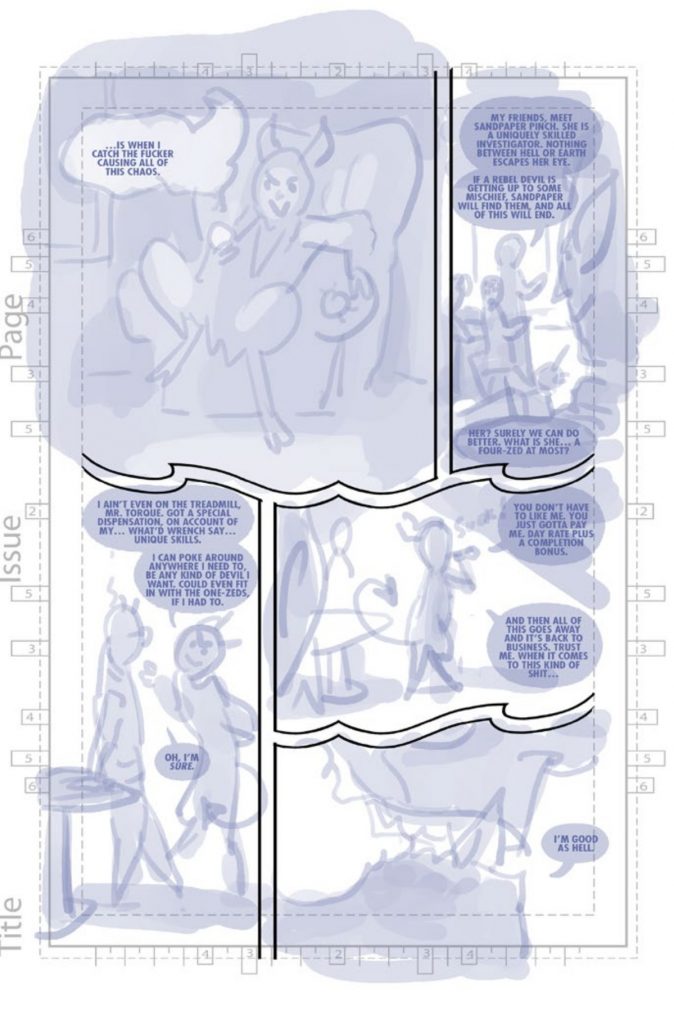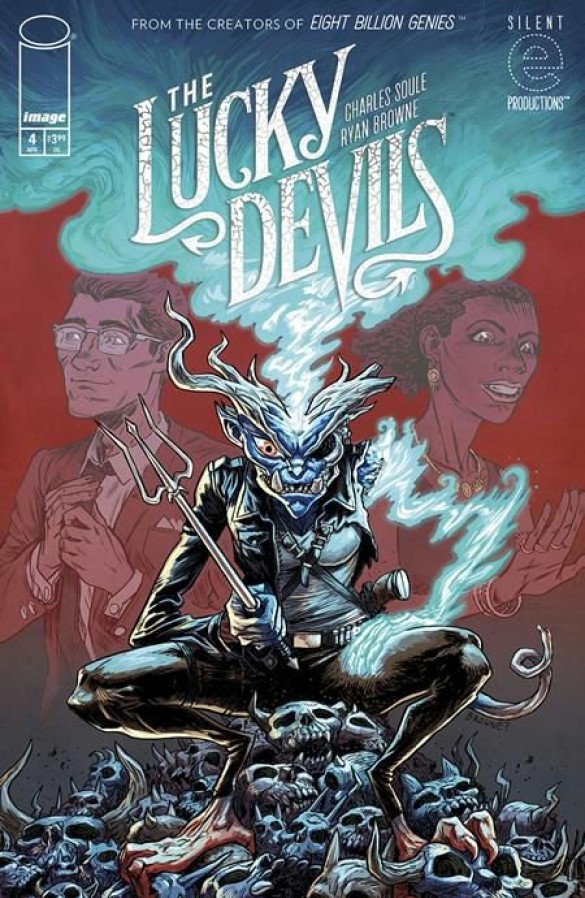“I’m Glad to Be Back”: Artist Ryan Browne on His Recent Stretch and What It Means for The Lucky Devils
While we as readers always expect comics to come out like clockwork, on a monthly schedule as always and not a second more, it isn’t always as simple as that. Sometimes the work takes longer than expected or things come up or, simply put, life happens. You never know what’s waiting for you around that corner, and when it comes, schedules slide through no fault of your own.
Artist Ryan Browne knows that all too well.
His new Image Comics series The Lucky Devils with his oft-collaborators in writer Charles Soule, color assistant Kevin Knipstein, and letterer Crank! started off like a house on fire, with a killer opening issue and a second that only built on that. But then its third issue slid a bit, schedule-wise, and its fourth issue faced a four month gap before release this upcoming August. Naturally, readers and retailers wonder, “What’s going on with The Lucky Devils?” Well, there’s a reason it slipped, and as is often the case with this sort of thing, it isn’t something Browne could have ever planned.
So, what happened? I’ll leave it to Browne to tell that tale, as today, you can read my recent conversation with him about what’s been happening with him of late, how what he’s been going through has affected his ability to do what he does, what it means for The Lucky Devils going forward, and a whole lot more.
It’s a great chat, and one that’s been edited for length and clarity. It’s also open for non-subscribers. If you enjoy this interview and would like to read more of my interviews and features on SKTCHD, consider subscribing to the site to do just that and to support the work that I do.
Let’s start with basics. What happened?
Ryan Browne: I had a stroke out of nowhere.
I just woke up one morning and was confused and couldn’t speak correctly and went to the hospital and they determined that I was having a stroke. They rushed me in and pulled the (blood) clot, which is a crazy experience because I was awake, and they put the clot grabbing scopey thing through my wrist to get to my brain.
I could feel the dude in my brain taking the clot out while I was awake, and when he broke the clot, he cheered, which was awesome. He was like, “YES!” (laughs) I was like, “yay.” But it was in the language center of my brain. Now in the scan I have a very healthy-looking brain, except for this one dark spot. It’s just like…dead brain.
Is that where the clot was? The dark spot?
Browne: Yeah.
My father died of a stroke and my grandmother died of a stroke. It’s kind of like my worst fear, but as I learned, I’m too young for it to have been genetically caused, and so I basically have spent the last almost four months talking to doctors and getting second opinions and full workups on every single thing. And they found no cause, which apparently happens all the time, which is terrifying.
It’s been a process, but it has basically made it so that I lost the ability to speak for a few hours, and then I slowly have relearned it.
I had a terrifying moment where I didn’t know if I could still draw. That was a big freaky thing.
When was that happening?
Browne: When I was in the hospital. That was the thing that I was really worried about. That I would try and draw and not be able to do it. The thing with brain injuries I’ve learned is…it’s like, “why can’t I say these words? I can think them–it doesn’t make any sense.” So, you get kind of trapped in your own head. And people do have strokes, and they can’t draw anymore. It depends on the part of your brain it affects, but…I don’t know what I would do if I couldn’t draw anymore. I mean, at some point it’s probably going to happen. At some point you’ll be old and have arthritis or your eyes go.
But it didn’t affect it at all.
I had the stroke right when I was finishing #3 of The Lucky Devils, so that issue got delayed by a couple of weeks, and I had to work on the colors piecemeal. My color assistant, Kevin Knipstein, who’s a childhood friend of mine, came over and spent several days at my house helping me finish the issue. And so that’s why issue #3 was late.
And then it was just like I couldn’t think straight. I had such severe brain fog and fatigue that I basically spent four months working on issue #4 of The Lucky Devils, which is almost done. I basically have slept a lot in the recovery. Apparently when your brain gets damaged, it will rewire around damage and make the connections again to restore function. And so that uses a lot of your metabolism and you get very tired from talking and listening to people talk and trying to read.
The damage was to my language center so every time that I was trying to use language it would make me tired. Which is just such a strange fucking thing to deal with, especially trying to type emails which is why we are doing this interview as a transcribed conversation thing.
This is the most important question, really. Are you okay now?
Browne: Yeah. They got it really quick, and because I’m comparatively young for when people usually have strokes, they said at the time that I’ll probably make a full recovery. It could take a year. Maybe a lot shorter. Three months was the big benchmark for when I should start having more normal days, and that pretty much lined up with what happened. Three months is when I started having some normal days.
I mean, I say I’ve been working on issue #4 for four months–I’ve really been working on it for the last month. But this is when I’ve been able to focus and not just have such intense fatigue. Now I’m at the point where I have days where I feel completely normal, which is nice. And so I will continue to build up and then I’ll presumably be able to do monthly comics again.
And The Lucky Devils is what I will be working on until it’s done. We kind of staggered the release schedule for issues #5 and #6 to give me two months to do each, because I don’t know exactly what will happen. I have good days and bad days. But it is full speed ahead. I can still draw. I can still storytell. I can still invent.
I’m pretty much back to normal for the most part.


It seems like there are three big things affecting you. There was the brain fog, which you had to contend with and made it very difficult to think through the story. There was the fact that you were just tired, and how are you going to sit at a table and draw when processing information is too taxing for you to be able to do? And then the other thing was what you had told me before we started recording, which was that you were having a hard time converting basically the language of the script into an actual story. How have you had to adapt the way you work to your new reality?
Browne: I drew the first four pages of issue #4, and each page took me about a week. I realized I couldn’t transfer Charles (Soule)’s words into pictures very easily. That was really taxing and too much of a brain puzzle. And the timing of it all, the fact that I had a script for issue #4 sitting there when I can draw, but I can’t think and I can’t process language the way I used to at that time, and I was like, How the hell am I going to do what is probably the hardest part of comic creation? The part that takes the most thought? Doing breakdowns where you take words and descriptions and trying to story tell with them visually.
When you say breakdowns, you’re talking about figuring out the page layout and how the panels all fit together and everything like that to tell the story?
Browne: Yeah. Some people call them thumbnails or layouts.
It’s just basically like, “Alright. Here’s a page. It has five panels. Let’s figure out what the most important panel on this page is going to be. Let’s figure out where I need to start and where I need to finish.” And then in terms of the story, you need to figure out the staging of where the characters are in relation to one another so that you can have the balloons go in the correct order and be read clearly. It’s a lot of problem solving that my brain couldn’t handle.
This is a stage where you solve all the problems. I think while I pencil and I think while I ink, but it’s not nearly as intense. So I basically just decided I couldn’t do it. And so, I asked Zander Cannon, who’s a good friend of mine, to do it for me. He probably is the only person I would ever ask to do it for me because one, he has a history of doing it for other artists going all the way back to Gene Ha and Top 10, and two, I am such a massive fan of all his work. Kaijumax is one of my favorite comics ever. And so I have a lot of trust in him as a storyteller.
We don’t draw the same way, which is fine. But it is a lot of just converting the words into pictures as a start. And so, I called him and asked him to do it, and he said yes. He did the breakdowns for the remaining 20 pages or so that I had for issue #4 and he did them pretty quickly. They’re really funny and adorable because there’s Zander drawings and they have big heads and short arms, and he’s not really worried about drawing the characters that look like the characters. It is more a shorthand for “the guy with glasses,” “the lady,” that kind of stuff.
He did that for the whole issue, and then I think I followed it about 75% in terms of what he was doing. But over the course of the last month, I regained the ability to do it myself. So, I was taking what he was doing as a start. The information was all contained there in a way that I could process visually, and that was way easier for me than looking at words and trying to decode them. It’s such a weird thing to injure your brain because you can’t understand it until you do it. It is like, “Why can’t I read these words and then figure out what panel they break down into?” It is very hard to explain.
It was nice that Zander was just like, “I’ll do whatever I can to help,” which was just so great and so helpful. And then of course, Charles has been incredible throughout all of this. He came and visited me as soon as he could. We have this company together and he basically had to take over doing most of the decision making and communications for our company and handling people who needed things from us. And then Image was incredibly awesome as well and has been as patient, supportive and understanding as I could ever have hoped for.
But it’s the type of thing where the book is just going to be late. And I had to just slowly learn to be okay with that because lateness is the one thing that Image stresses will kill your numbers. And so it is what it is. I felt like we had some good momentum going through the first three issues and a lot of interest. People seemed to be positive about it.
And then it’s just like, “I hope you remember me when we come back.”


It’s easy to say that you understand this mentally. That something has happened where it makes you unable to do the work. But it seems like you actually got to a point where you understood that this wasn’t your fault, there wasn’t really anything you could do about it, and there’s no reason to beat yourself up with it. I imagine the mental side of all that was…I don’t want to say it was worse than the stroke. But I imagine at a certain point it was probably one of the more difficult things for you to navigate.
Browne: It has been tough to figure it out emotionally. It was my greatest fear from the family history of it. And then it happened, and then I was really hoping…a big reason why people have strokes young is that they have something called a PFO, which is a hole in your heart. We all are born with a hole in our heart, and for most people, it closes up as you grow. Every once in a while, it doesn’t. And they usually call it “the widowmaker” or something like that. Like when a high school basketball player drops dead on the court. It’s usually that. It’s a thing that you can see, but you have to know to look for it. And people aren’t all going to go get the scope to…I had it. They put you under and they put a camera down your throat and they can take pictures of your heart more clearly from inside your body. (laughs)
It’s crazy stuff, man.
So, you have the book. It’s a very public thing. You also had the C2E2 party for The Lucky Devils and Minor Threats that I believe you went to at least for a little bit and everything like that. You are a public figure and even went to a party after this as a representative of your book.
And we’re in an age of oversharing where social media finds us putting everything out in the world. Everything that we do. This is your own business, obviously, and I feel weird asking about this, but what made you want to keep this to yourself until now? Was it just you wanted to figure out where you were going to go before you started talking about it?
Browne: I’ve always taken the stance that I want to be a source of escapism and entertainment. I don’t really put anything personal online, and I don’t put things that are emotionally triggering for people online. That’s not what I want to do. I want my art to speak for itself, and I don’t want my social media to be me posting memes of how awful our world is. I want to be like, “Hey, our world is awful and you’re seeing it all the time, so here’s a little escapism.” Some people don’t agree with that approach. I think my art in general tends to be pretty subversive. I think you can see where I stand politically and in terms of the scale of the empathy for humanity and such, and I don’t think you need a bummer from me.
When my dad died right at the beginning of the pandemic, and I kind of struggled. I was like, “I should post something online about this.” but then I didn’t want to be the comic creator that had a sad thing that happened.
This is little bit of a tangent, but when you post online how you’re going to have a baby or you post online, “Here’s our baby, yay.” That puts you on an advertising track that they know to advertise for all the different steps of development of a child all the way to after a certain amount of time, it starts advertising for fertility stuff because this is the typical time that you want to have a second child and the stages of diapers to pull up to all this stuff. You are put on an advertising track because you wanted to talk to people that care about you about having had a child.
And so, I was just like, I don’t want Instagram ads for Plavix or anti-stroke medicines, because that information would be scraped and that’s what would happen. It is an invasive thing. And so I’ve learned as I’ve gotten older to pull my reality away from what I share, but also, I don’t like making excuses, and I don’t want people to feel sorry for me. I want people to look at my drawings and laugh and be entertained by my art. That’s what I want.
If there’s a way that people can know that this cause the book to disappear for a while. It’s not because I don’t care about it or that I was screwing off and not doing my job. If there’s a way for people to know that without having to go through the whole sitting around feeling sorry for me phase, then I’m okay. (laughs) I talked to Image about it and (Image Publisher) Eric Stephenson, and it is a weird thing because I think that if you have a stroke or some sort of ailment, it gets attached to you in terms of what people think of you. And so, I wanted to make sure that I didn’t really talk about it until it was clear that it wasn’t going to be a thing that would define me going forward.
And I only still did C2E2 because it was my hometown show. I’m not allowed to go anywhere. And the most exhausting activity for me was me trying to talk to people. We had already gotten everything in place for the big party that we did for The Lucky Devils and Minor Threats, so I just endured it. I was so miserable. I slept for the next week and a half following that weekend. I literally slept for five to six hours during the day and then went to bed at night and slept for another 10 hours. I didn’t do anything. I couldn’t do anything. I couldn’t keep my eyes open. It was like a week and a half where I just couldn’t do anything. It destroyed me.
But it was awesome because it was nice to see everybody again. And it was weird to tell people you have a stroke, because when you do, they don’t know what to say. They think that you’re joking. Most people think you’re joking. (laughs)
It also becomes the focus. It’s kind of what you were talking about before where you don’t want it to define you, but at least for that conversation it’s going to define you. You don’t always want that to be everything you talk about, I imagine.
Browne: Yeah. And if I ever brought it up to somebody, it clearly completely changed the way they treated me. It is what it is. If I said I had cancer, it would change the way that you perceive my life and my mental state, I’m sure.
If it makes you feel any better, I still tried to beat the shit out of you in Fantasy Baseball even though I knew you had a stroke.
Browne: Oh, dude, my Fantasy Baseball teams are so bad. (David laughs) I did all these drafts, and I couldn’t think. My brain’s so scrambled. I missed the first half of our draft.


It seems like you’ve figured out breakdowns. Are you going to be handling that going forward, or is Zander still going to be on call?
Browne: I won’t know until I get to it, but I think I can do it now. As it went on for the last 10 pages or so, I started leaning a little less on what he was doing.
You’re almost retraining your brain. You were figuring it out by going through it again.
Browne: It is. I had to relearn this stuff. I’m doing it using different parts of my brain now. And I also think my drawing looks different and strange to me, and I can’t pinpoint exactly what it is. But then I also think The Lucky Devils is such a dense book with such short scenes. So much has to happen. So the scenes are like a page or two pages and a new scene needs to be established or new characters need to be established. So there’s so much information on every page. And maybe that’s why I am thinking that my art is looking different. It’s not worse. I think it’s just a little different.
I have to get some artist friends to look at it for me because I’m curious what they would say. But it is interesting to have this pre-stroke Ryan and post-stroke Ryan on the first three issues. Some of the art of the end of issue #3 is a little rough, and I’m going to correct stuff for the collection because I was struggling. But yeah, it was interesting to have this line of demarcation. Issues #4 through #9 will be done with a different part of my brain.
So, The Lucky Devils #4 at least currently is planned to come in August, and #5 is slated for September. It sounds like, at least in the near term, you’re giving yourself two months to do an issue as opposed to trying to push yourself to do it in four weeks or six weeks or whatever. What does the roadmap for the book look like from here for you?
Browne: Well, hopefully I can get back on track. I canceled all conventions for the time being because of my stroke and difficulties with socializing. But also, when you do a convention, you’re probably losing part of Thursdayof work and then Friday and then Monday you might take some time off because you’re tired. I need every day to be working on this book. So, I’ve completely cut off that revenue stream and that fan interaction feedback, which is always so positive and nice.
But the important thing is getting the book done. We did this on Eight Billion Genies where the last three issues were late and issue #7 had 32 story pages. We didn’t charge any more than if we had done 20 pages, but it’s what the story needed. So, we just did it. When you make a comic, every page you make costs money and time. But we just did it. And so that’s what we are going to do with Lucky Devils going forward. Hopefully our fans haven’t forgotten it and people will keep their orders strong for issue #4, but the end goal is to have the hardcover on my shelf and be proud of every moment of it.
I could drop backgrounds out all over the place. I could ink over thumbnails instead of tighter pencils. I could do that. There is a way to make this book very quickly. It would not be the same experience. So, I think we’re just going to keep going on the path that we have and I’m going to keep putting in as much effort as I can and as many little gags and details and jokes as I can. And it will come out when it comes out and hopefully people will be understanding.
It’s a whole new experience going forward. I hope I can continue to do this job and make money doing it. I hope that this doesn’t shake retailer confidence in the books that Charles and I do. I totally understand that stores ordered this book and invested in it, and for it to not come out, makes their customers unhappy and then makes them have to give excuses or whatever, and it makes it not the reliable experience that stores want it to be.
I’m glad to be back. I’m glad to be so far down the road of recovery that normalcy is not far off. I’m glad to be telling stories again.
If you enjoyed this interview and would like to read more of my work on SKTCHD, consider subscribing to the site to do just that and to support the work that I do.

